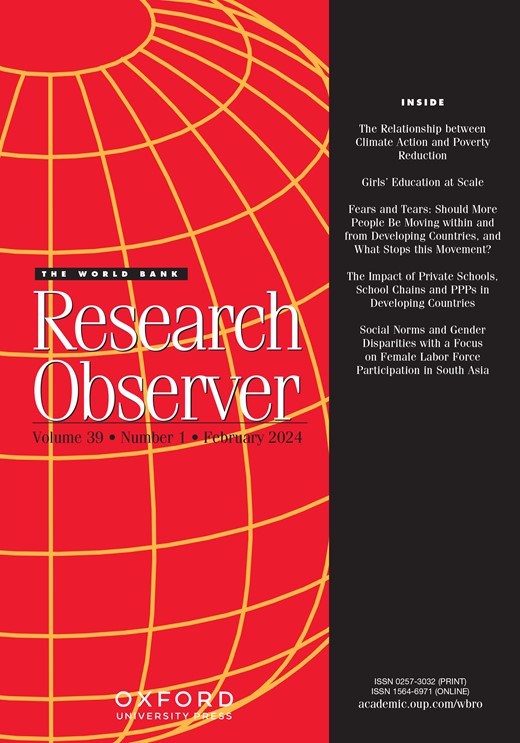Banking and Regulation in Emerging Markets : The Role of External Discipline
IF 3.3
1区 经济学
Q1 DEVELOPMENT STUDIES
引用次数: 32
Abstract
This article reviews the main issues of regulating and supervising banks in emerging markets with a view toward evaluating the long-run options. Particular attention is paid to Latin America and East Asia. These economies face a severe policy commitment problem that leads to excessive bailouts and potential devaluation of claims of foreign investors. This exacerbates moral hazard and makes a case for importing external discipline (for example, acquiring foreign short-term debt). However, external discipline may come at the cost of excessive liquidation of entrepreneurial projects. The article reviews the tradeoffs imposed by external discipline and examines various proposed arrangements, such as narrow banking, foreign banks and foreign regulation, and the potential role for an international agency or international lender of last resort. Liberalization and integration of financial markets have been associated with an increase in capital movements and with the financial crises. In particular, surges in foreign short-term debt have been blamed for crisis episodes in emerging economies in Asia (Thailand, Indonesia, and the Republic of Korea) and Latin America (Mexico, Brazil, Ecuador, and Argentina), as well as in the periphery of Europe (Turkey). These crises have proved costly in terms of output. Several policy responses have been suggested. Among them have been the reduction of short-term debt, the development of stock markets, the improved regulation and supervision of domestic financial system, enhanced transparency requirements and market discipline, and the establishment of an international lender of last resort. A catalog of “solutions” has been proposed to take care of the problems of banking in emerging market economies including moving to a narrow bank system, building a currency union, and leaving banking in the hands of foreign banks and offshore institutions. This article identifies policy responses tailored to the needs of emerging market and developing economies. The question is whether the regulatory policies and新兴市场的银行和监管:外部纪律的作用
本文回顾了监管和监督新兴市场银行的主要问题,以评估长期选择。特别注意的是拉丁美洲和东亚。这些经济体面临严重的政策承诺问题,导致过度纾困和外国投资者债权的潜在贬值。这加剧了道德风险,并为引入外部纪律(例如,购买外国短期债务)提供了理由。然而,外部纪律可能以企业项目过度清算为代价。本文审查了外部纪律所带来的权衡,并审查了各种拟议的安排,如狭义银行、外国银行和外国监管,以及国际机构或国际最后贷款人的潜在作用。金融市场的自由化和一体化与资本流动的增加和金融危机有关。特别是,外国短期债务激增被认为是亚洲新兴经济体(泰国、印度尼西亚和韩国)、拉丁美洲(墨西哥、巴西、厄瓜多尔和阿根廷)以及欧洲外围国家(土耳其)爆发危机的原因。事实证明,就产出而言,这些危机代价高昂。已经提出了若干政策对策。其中包括减少短期债务、发展股票市场、改进对国内金融系统的管理和监督、加强透明度要求和市场纪律以及建立国际最后贷款人。为解决新兴市场经济体的银行业问题,各方提出了一系列“解决方案”,包括转向狭义银行体系、建立货币联盟,以及将银行业交给外国银行和离岸机构。本文确定了适合新兴市场和发展中经济体需求的政策应对措施。问题是监管政策和
本文章由计算机程序翻译,如有差异,请以英文原文为准。
求助全文
约1分钟内获得全文
求助全文
来源期刊

World Bank Research Observer
Multiple-
CiteScore
12.60
自引率
1.20%
发文量
8
期刊介绍:
The World Bank Journals, including the Research Observer, boast the largest circulation among economics titles. The Research Observer is distributed freely to over 9,100 subscribers in non-OECD countries. Geared towards informing nonspecialist readers about research within and outside the Bank, it covers areas of economics relevant for development policy. Intended for policymakers, project officers, journalists, and educators, its surveys and overviews require only minimal background in economic analysis. Articles are not sent to referees but are assessed and approved by the Editorial Board, including distinguished economists from outside the Bank. The Observer has around 1,500 subscribers in OECD countries and nearly 10,000 subscribers in developing countries.
 求助内容:
求助内容: 应助结果提醒方式:
应助结果提醒方式:


